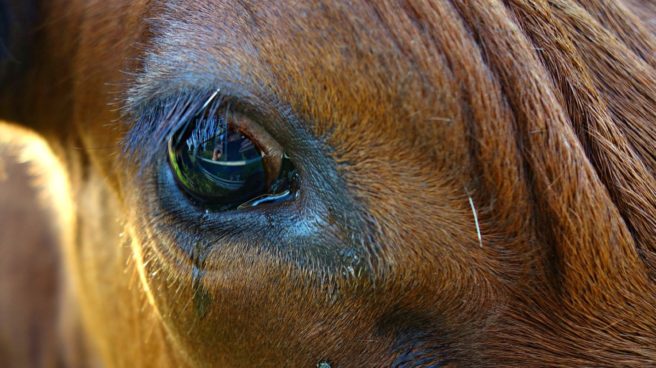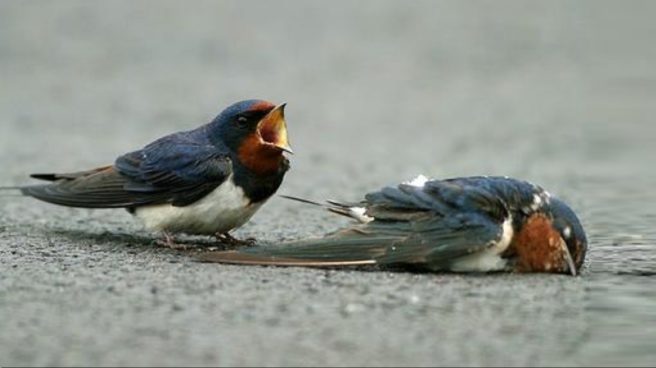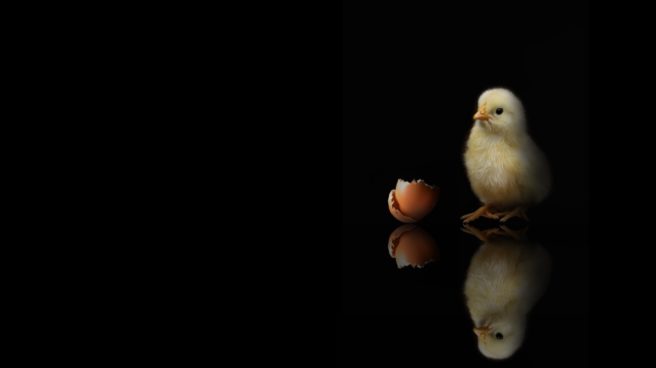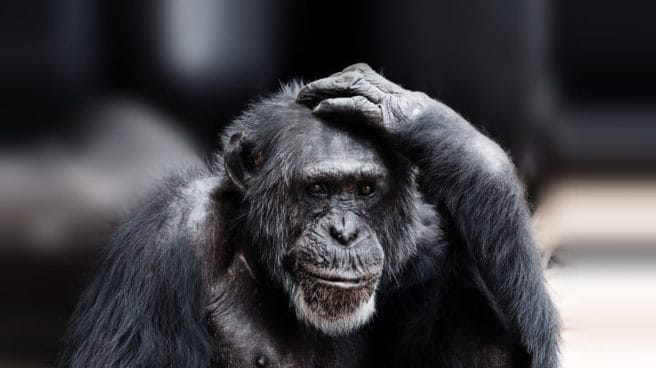Humans have long used our ability to experience complex emotions to distinguish ourselves from other animals. But is this ability really isolated to our species? And if non-human animals do have the capacity to emote, what does that say about how we treat them?
Harper and Kohl were best friends. They’d been through serious trauma together and made it out on the other side, bonded closer than ever. The pair were inseparable. Then came the day that Kohl could no longer walk. The pain was too great. And he passed away. Harper laid beside him for hours. In the following weeks, he kept himself isolated from others, just sitting near the pond he and Kohl used to frequent. Two months later, Harper, grief-stricken, passed away as well.
Kohl and Harper, these loyal friends, were ducks.
Something that we humans have long used to distinguish ourselves from other animals is our ability to experience complex and profound emotions. But is this ability really isolated to our species? And if animals do have the capacity to emote, what does that say about how we treat them?
Strangely, we tend to place the capacity for emotion on some animals and not others, as evidenced by our pathological need to anthropomorphize our “pets” (companion animals). The same person who will tell you that chickens can’t grieve will in the next breath give a full psychoanalysis of their dog’s emotional state.
So between our callous writing-off of certain animals’ emotional capacities and our own emotional projections upon others, where does science fit? Though Darwin believed that, given the evolutionary connection between humans and other animals, emotions must me similar across species, this concept fell out of favor in the scientific community by the early 20th century.
Animals obviously possess complex inner lives that we are not entirely privy to.
Is it really ethical to treat them as inferior, unemotional, unintelligent creatures until we decide we have enough evidence to the contrary?
— Emily Moran Barwick
Attribution of what were seen as human emotions to animals was, and often still is, viewed as anthropomorphic and subjective. But slowly, this stance has begun to relax as data from within the animal behavior scientific community has repeatedly challenged the assertion that non-human animals lack the capacity for complex emotions.
It started with two of the mammals that we humans tend to value more: chimpanzees and elephants. Anthropologist Jane Goodall observed and documented the heart-wrenching account of the young chimpanzee, Flint, his decline and eventual death from grief only weeks after his mother died. In her book Through a Window, Goodall recounts,
“Flint became increasingly lethargic, refused food and, with his immune system thus weakened, fell sick. The last time I saw him alive, he was hollow-eyed, gaunt and utterly depressed, huddled in the vegetation close to where Flo [his mother] had died. The last short journey he made, pausing to rest every few feet, was to the very place where Flo’s body had lain. There he stayed for several hours, sometimes staring into the water. He struggled on a little further, then curled up–and never moved again.”
Elephants are something of the poster children for animal grieving as they have been observed on many occasions visiting the bodies of fallen members of their species, even outside of their family, and caressing the bodies or even bones with their trunks.
A particularly compelling example of elephant mourning comes from Jain Douglas-Hamilton of Save the Elephants as relayed by Barbara J King in When Animals Mourn:
“When Eleanor, the dying matriarch of an elephant family, collapsed, a matriarch named Grace from another family immediately came to her aid, using her tusks to support Eleanor back onto her feet. When Eleanor fell again, grace stayed with her, pushing on her body, for at least an hour, even though her own family moved on. Then Eleanor died. During the course of the week that followed, females from five elephant families, including Eleanor’s own, showed keen interest in the body. Some individuals appeared upset, pulling at and nudging the body with trunk and feet or rocking back and forth while standing over it.”
It’s easier for us to recognize emotions in larger-brained mammals, particularly ones we traditionally have romantic notions about like elephants, gorillas, chimpanzees, and dolphins. We can look at the account of Fabian Ritter of Mammal Encounters Education Research of a rough-toothed dolphin mother alternatively pushing and carrying her dead calf’s body for miles, or Gana, the captive gorilla, who carried the body of her dead infant around and recognize profound loss, even grief.
We hear accounts of dogs holding vigil over their owners’ bodies or graves, and passing away soon after and don’t even question whether they are mourning. But what about those species we don’t feel so connected to, like birds or fish or, even more troubling, what about those species we enslave, kill and consume?
We see elephants’ recognition and mourning of their fallen brethren as the remarkable practice of an intelligent and emotional species. But what do we say about the sorrowful bellowing of a bull as he encounters his own slaughtered kin on a public street display of cow meat and skin? Here is a species we consume on mass and widely portray as unintelligent and unemotional. But what are his cries if not agonizing grief?
We’ve already heard of Harper and Kohl, the two ducks with the inseparable bond. The trauma they had both endured was life and near death on a foie gras farm where they were violently force-fed, resulting in hepatic lipidosis, a liver disease. Harper also lost sight in one eye and Kohl was left with deformed legs, a disability which eventually ended his life and, subsequently due to immense grief, Harper’s as well.
These two ducks had a profound friendship and Harper experienced the loss of his dear friend in a manner that, if expressed in a dog, cat, elephant, great ape, or other more relatable species, would unquestioningly be seen as deep mourning.
But we simultaneously acknowledge and dismiss this capacity in our food animals. In 2013, residents of Newburry, Massachusetts called into the police regarding strange and disturbing, inhuman sounds near the sunshine dairy farm.
The police sergeant put out a statement assuring citizens that the noises were coming from mother cows lamenting the separation from their calves. She explained it was a yearly occurrence and is a normal function of a working dairy farm and that the cows were not in distress.
How can we on the one hand recognize mothers crying out in agony for their babies, so loudly and desperately that people in the town can hear them, yet on the other hand say they are not in distress? And, more importantly, how do we continue to justify this treatment as a normal part of our practices?
Confronting other animals’ capacity for emotion means confronting our behavior towards and treatment of them.
— Emily Moran Barwick
Is kidnapping the newborn children of other beings so that we can have their milk really normal? And is it really worth all that heartache and loss? These are the questions we have to ask ourselves when confronting the emotional lives of non-human animals.
We may feel compelled to chalk it all up to evolutionary instinct. Western scrub jays, for example, hold what we would call funerals when they encounter a dead member of their species. Teresa Iglesias and colleagues from the University of California-Davis noted that jays, on seeing a dead bird, gather around and cry out. This is seen to be a tactic to warn others of a danger and thus evolutionarily beneficial.
But most aspects of grief are not advantageous at all. So why, then, do animals, us included, have this emotion? In When Animals Mourn, anthropologist Barbara King proposes that “what is adaptive, then, may not be grief itself but instead the strong positive emotions experienced before grief comes into the picture, shared between two or more living animals whose level of cooperation in nurturing or resource-acquisition tasks is enhanced by these feelings.”
In short, if there is grief, there must have been love. [tweet this] King states in How Animals Grieve:
“Love in the animal world often entwines with grief in an acute mutuality. Perhaps even more than the degree of social cohesion within a species, it is love between individuals that predicts when grief will be expressed.”
Strangely enough, we are consistently astounded by non-human animals’ emotional capacities. Every now and again there’s a new article or study expounding upon the amazing possibility that animals may feel x, y, or z emotion, or be far more intelligent than we once thought.
Yet somehow, we don’t take these revelations to their ultimate conclusion: Animals obviously possess complex inner lives that we are not entirely privy to, and is it really ethical to treat them as inferior, unemotional, unintelligent creatures until we decide we have enough evidence to the contrary? [tweet this]
As to why animal emotions are not studied more, King makes the apt observation that:
“To plumb the depths of animal thinking and feeling means to reassess how we, collectively as a society and individually as persons, treat other animals.”
Confronting other animals’ capacity for emotion means confronting our behavior towards and treatment of them. And relegating them to an inferior status is certainly easier and far more comfortable…for us. [tweet this]
Whether it’s the story of a group of horses holding vigil at the grave of their friend, Storm Warning, or Tarra the elephants’ grieving of her canine friend Bella, or the anguished cries of sea lions when their babies are taken by predators, or even the heart wrenching grief of a mother dairy cow whose child has been ripped from her, it’s undeniable that non-human animals are emotional beings. [tweet this]
They may grieve differently from us, and from one another, but their loss is no less profound and their heartbreak no less tragic. And they deserve our respect and compassion. [tweet this]
I’d love to hear your thoughts on this subject. Do you have an experience with non-human animal grief? Do you believe in their emotional capacity? Let me know in the comments!
— Emily Moran Barwick







I wish the people of this world would change their ways of thinking and be kind to all. Sad but Great little movie!
thank you Tamika- and i’m with you 100%.
Lady you are AMAZING! Ok you are super talented! You honestly need to be on PBS or doing documentaries… you seriously should submit this video to an agency or something!!! Second, excellent content, I totally cried! Thanks you for doing this in-depth report… it truly is completely illogical for us to pick and chose which animals are food and which are non-food… I mean as a former meat eater, I know upon hearing they eat Dogs in China, sent shivers up my spine… but eating a chicken or cow was fine. NOT. I met some cows at a retreat I went to and one of them would follow me everyday from the little cottage I stayed in up the road to the main house. And she like to be pet and ever after thats when my thoughts started to change. Plus… as far as dairy goes… just look at the amount of dairy allergies… and I could go on… but again your video ROCKED. And honestly your style and demeanor and stage presence is just as good as anyone I have seen on TV. You honestly need to be in the world more :)
wow thank you so much Jamison! that really means a lot to me. and you’re so welcome. i’m so glad to hear it resonated with you. and amen to ending speciesist arbitrary discrimination! thanks so much for the lovely comment! ;)
This was a powerful video, so much truth and feeling in this. I have witnessed first hand the capacity of animals to greive, from squirrels to ducks to dogs – all cry out in sadness and pain. I find myself often placed where I am present to bear witness to the death of a creature – usually at the fault of mankind and our encroachment on nature, and I am *always* caught off guard by the power in their feelings, the connection is the same as that which we feel when we lose a friend or family member, the ache is the same… But people don’t listen because there are no tears, there are no words. Thank you for this post, empathy will be what leads this world to veganism. <3
thank you Julia- so glad to hear it was powerful for you. and thank you so much for sharing your own witness. and it’s true- their capacity to feel is very strong and their displays of emotion moving….when you actually are open to seeing them.
Excellent article. Anyone who has shared their life and home with a pet understand and know that animals have feelings and emotions just as humans.
Those that deny this do this because they want to justify the eating of animals.
I love the link to Darwin’s book, I never heard of it but it sounds exciting.
Kind Regards,
Sally Anne
beautifully sad video emily, one of my favorites!
i can really see through your eyes..
thank you so much. so glad you connected with it.
Very powerful and informative video! When my cat died two years ago my dog definitely grieved. They were best friends and always did everything together and once Kye (my cat) was gone Lyra (my dog) was very lethargic and would wander around looking for him. It was heartbreaking. I cannot understand how people can experience these moments of animal emotion and yet disregard it because it is not convenient for them.
thank you so much Katie. and thank you for sharing the story of your dear companions. they most certainly do grieve one another.